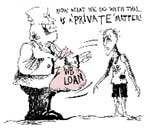Prude operator
Prude operator

the World Bank's (wb) efforts to expand its highly successful operations to attract private investment to developing countries have some observers worried that policies on the environment, participation and resettlement are being sidestepped by Bank officials.
At their recent annual meeting in Washington, wb directors signalled strong support for expansion of the International Finance Corporation (ifc), which co-finances development projects, and the Multilateral Investment Guarantee Agency (miga), which protects investors from political risks.
But even as the wb attracts more private capital, one watchdog group says the quality of investments is falling. Recently, Friends of the Earth (foe) issued a report in Washington, us, accusing the ifc and miga officials of playing by "a new set of rules', whereby the Bank's existing policies do not apply to the growing rolls of "corporate clients'.
Some private partners of the ifc admit that wb standards are sometimes negotiable, for example, as in the cases of Pakistan's Lal Pir and PakGen coal-fired power plants. Such trends suggest that environmental and social concerns do not enjoy the same priority as project cost, design and time frame.
Both the agencies, which are outside the purview of the wb's independent inspection panels formed in 1993, have agreed to set up their own inspection panels, almost half of which will consist of private sector representatives. This, says Andrea Durbin of foe, suggests that they are "overly concerned with protecting business interests'.
The ifc has also been faulted for concentrating its activities in better-off developing countries, contrary to its stated objective of attracting investment to the poorest of the poor.







